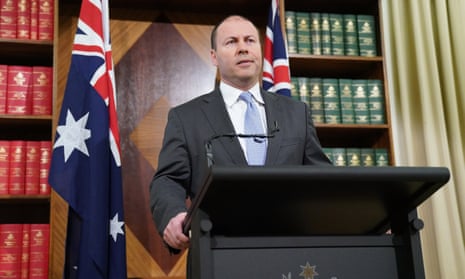Josh Frydenberg has called on the states to bring forward smaller-scale infrastructure spending to boost the economy after a meeting with his state counterparts, without uttering the word “stimulus” once.
Frydenberg and the prime minister, Scott Morrison, don’t like to invoke the “S” word. But with the RBA having been forced to cut interest rates to historic lows in an attempt to boost economic activity, and with tax cuts having done all they can do for now, the federal treasurer, meeting with his state counterparts in Canberra on Friday, instigated discussions on how to bring forward lower-tier infrastructure projects to get things moving more quickly.
Friday’s discussion was in the context of productivity-enhancing measures.
“What we’re suggesting is that there are potentially projects within that 10-year pipeline that could be brought forward,” Frydenberg said.
“But the key challenge here is, if you bring some of the spending forward, can you also bring the construction timetable forward?
“So we are getting … across some of those constraints that are across machinery, across inputs and they’re also across skills.”
Danielle Wood, the budget policy director at the Grattan Institute, said she could understand the government was nervous about the economic data it was seeing.
“I think they had pinned their hopes on a consumer-led recovery off the back of the tax cuts and lower interest rates,” she said.
She could also see why he avoided the “S” word, with another “S” looming large on his horizon.
“He may be concerned about spooking the horse. He has always been very conscious of putting a gloss on the economy, and what it is facing.
“But he is also concerned about the other big ‘S’ in his life: the surplus. You can’t really be talking about stimulating your economy while your budget is in surplus. It doesn’t work like that.
“We know we will be seriously talking about budget stimulus in a world where the government is willing to give up its slated surplus, but I don’t see that happening.”
The treasurers’ discussion centred on what funding the commonwealth could potentially bring forward, with the idea being the states could then free up their funds to spend on lower tier infrastructure projects.
So far Queensland has been the only one to formally respond to the commonwealth’s offer but the details so far have been kept under wraps in a sign of good faith.
But the Queensland Labor government has made no secret of the fact it wants the feds to chip in early on inland rail, expanding the M1 motorway, a longed for Sunshine Coast rail track duplication, the third stage of the Gold Coast light rail project and north Queensland Bruce highway funding.
The commonwealth has made much of its $100bn infrastructure spend but the vast bulk of the money sits in the never-never. By bringing forward some of that money the states can reuse earmarked funds for smaller projects such as commuter carparks and roundabouts.
It’s school halls 2.0: the unnamed stimulus.
“What we discussed today, perhaps not always using a tier one or tier two contractors, but some of the smaller providers,” Frydenberg said. “The states talked about maintenance programs, and as you know we currently provide significant funding for road maintenance, both through the states directly, but also through local government.
“So they know that we’re spending a lot on infrastructure and by the way the states are spending a lot on infrastructure too, record amounts, and the capacity constraints are real, but what we do want to do is work with them.
“And as the RBA governor has said, it’s important to have a pipeline of infrastructure that is continually updated and increased over time.”
The Master Builders Association was a little more blunt.
“It’s good to see the federal government focused on working with the states to advance the rollout of smaller projects that can be rolled out more quickly, particularly in jurisdictions outside Sydney and Melbourne where there are not capacity constraints,” its chief executive, Denita Wawn, said.
“It will provide opportunities for smaller construction contractors from across the country and boost local businesses, economies and communities.”
Wood could understand Frydenberg’s hesitancy in bringing forward an infrastructure spending timeline without firm commitments on how and when it would be spent.
“I think Frydenberg is right to be cautious about releasing funds early, without construction actually starting,” she said. “We do know those capacity constraints are real, and it does no good to release money unless the states can genuinely bring forward construction activity.”
Wood said while maintenance spending was one of the states’ previous demands, there were other options the government could look at which avoided the capacity constraints – equipment, labour, skills – which had been outlined for some of the major transport projects.
“There is enormous capacity to stimulate social housing spending, which is an area that is overlooked but would, as well as the social need and impacts, really help stimulate a part of the economy which is especially hit hard in downturns like this: the housing construction industry,” she said.
Labor’s Catherine King was stinging over the non-announcement announcement’s lack of detail.
“It appeared this morning that Josh Frydenberg had finally listened to the RBA governor who has repeatedly called for the government to bring forward infrastructure investment to stimulate the sluggish economy,” she said. “Yet this afternoon Josh Frydenberg failed to announce a single project that will be brought forward.
“Good governments invest in infrastructure to improve the lives of all Australians and boost our economy – as Labor did in government.”
Meanwhile there is another fight brewing in the commonwealth’s future, with preliminary discussions on streamlining approval processes, including those in the environmental sphere, to boost productivity having begun at the recent treasurers’ meeting.
The green tape bogie was once again raised as a future issue of contention, with talks beginning on how many approvals are too many, and who should be able to give them, including whether the commonwealth or the states cede their current responsibility.
Those in the room were keen to stress the preliminary nature of the discussion, but still highlighted it as a potential future issue, with neither side seeing the other wanting to give up their powers.
But the door has been opened.
“We want the commonwealth to remove duplication across major approvals and recognise the responsibility states already have for environmental and planning approvals,” the Victorian treasurer, Tim Pallas, said.
“We don’t want to lose any of the scrutiny when it comes to major project approvals. Rather, we need to streamline the process to get works under way sooner.”

